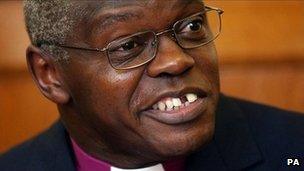Archbishop of York John Sentamu attacks executive pay
- Published

Dr Sentamu said those who rewarded themselves financially should not receive public honours
The Archbishop of York has said the salaries of top executives "weaken" community life.
Dr John Sentamu said excesses in the financial sector had helped to create huge inequalities in wealth.
The archbishop called for a change of ethics regarding high incomes and the accumulation of private wealth.
He said there was little evidence that high executive pay improved productivity and criticised tax avoidance.
'Dog eat dog'
Dr Sentamu, the second most senior figure in the Church of England, said excesses in the financial sector demonstrated how "scandalously unfair" society had become.
He added: "If the concept of the Big Society is to become a reality, so that people come to know and take more care of each other, income differences must surely be reduced.
"No one wants a 'dog eat dog' society in which people feel obliged simply to fend for themselves."
Dr Sentamu said in recent decades gains from economic growth had gone disproportionately to those who already had the most.
He said: "Among the ill effects of very large income differences between rich and poor are that they weaken community life and make societies less cohesive.
"If they (FTSE 100 chief executives) have a responsibility to their staff, it is hard to imagine a more powerful way of telling someone that they are of little value than to pay them one-third of 1% of your salary."
Profound change
Dr John Sentamu said he was calling for a change in public attitudes towards excessive personal wealth as profound as moves against racism, homophobia and sex discrimination.
He suggested royal honours should not be given to people who had already rewarded themselves with high pay.
The archbishop also proposed adding a tick-box on tax forms to allow contributions to be made public.
He said: "Not to tick the box would suggest that you felt you had something to hide.
"Each thousand pounds of tax avoided presumably means an additional thousand pounds of cuts to public services on which the least well-off are particularly dependent."
- Published5 November 2011
- Published3 November 2011
- Published8 October 2011